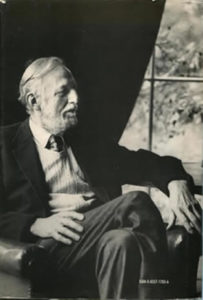
Thomas Parkinson 1920 – 1992
Professor of English at the University of California, Berkeley. He was a poet and scholar with particular interest and writings about the poetry of W. B. Yeats. Tom was also one of the first academic authorities to write about the Beat poets and novelists of San Francisco in the 1950s. He was also well associated with the beginnings of Pacifica KPFA, sharing with the founder, Louis Hill, the vision of a community supported, broad range cultural institution for the arts, sciences, and a voice for the political Left. Tom was a central contributor to our programming and was among those who created the Drama & Literature Department. In particular Tom made it possible for us to receive funding from various sources. His association with our National Endowments brought their award committees to our offices and heard our intentions for programming literature as an audio art. Thus began some remarkable years of programming and support from both artists and listeners.
RADIO ARTS PROJECT : 1970 – 1979
The following combines three program series funded by the National Endowment for the Arts and National Public Radio. The object was to bring together writers, actors, sound artists and technicians to originate and collaborate on the production of new works for radio. The work represented the full spectrum of radio drama, from the traditional to those more experimental and innovative. Assisting in the selection of writers were UC English Professor, Tom Parkinson, and BBC Dramaturge Martin Esslin. Technicians and sound designers were already at hand at Pacifica KPFA and Fantasy Studios in Berkeley, and in particular those working in film sound design, where they had the latest sound equipment available and the necessary technical skills for using them.
With independent funding the project could make use of facilities outside the confines of the radio station, and we could pay artists, writers, performers, technical designers. Furthermore, the arts funding gave us some small but vital independence from the growing demands of the radio station. I was soon able to offer half my Pacifica KPFA salary to a department assistant director. Padraigin McGillicudy, and later Susan Stone, were highly talented radio artists and contributed greatly to the Drama Department’s regular programming.
The productions led also to another growing interest, the use of locations outside the studio as a resource in the making of radio drama. Documentaries long showed the way, and European radio drama was already bringing the outside world into the studio. At BBC and WDR they could duplicate any outside natural ambience they needed within the walls of their remarkable studios. Our particular interest, however, was to encourage writers to give more attention to the sound locations they chose for their radio works. One of our writers, Drury Pifer, disenchanted with studio conditions during the production of his play Head, set his new play. Object Piece (see below) as far from our studios as he could imagine, a desert area, with a plot for which any extraneous sounds could be part of the production.
Also at hand were sound designers already heading into the film world. Randy Thom, soon to be embraced by Lucasfilm, took over the sound production of Pifer’s play. Soon after, with further funding we would be able to devote an entire project, Locations, with sound designer James McKee to experiment with these ideas. Randy Thom by then had won his first Academy Award, but with further funding from WDR Köln he composed several purely acoustical works for our project. See credits for these two artists and their accomplishments in our Ensemble section.
The works in this Radio Arts Project progressed at their own pace and when completed they were broadcast on Pacifica and selected by other radio stations in the USA & Europe. The commissioning of writers, scripting, and all the studio work covered a period of nine years. Much of that time we were working around other radio productions and KPFA programming duties. But also working around the many months of long, arduous preparation for new proposals to our Endowments and other sources, for funding to continue the series.
BARD Content:
Overview |. Archive. |. Photos |. Ensemble. |. Links
